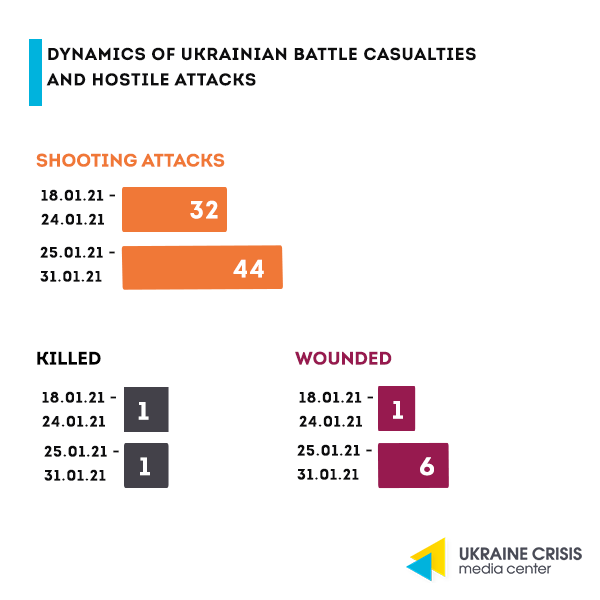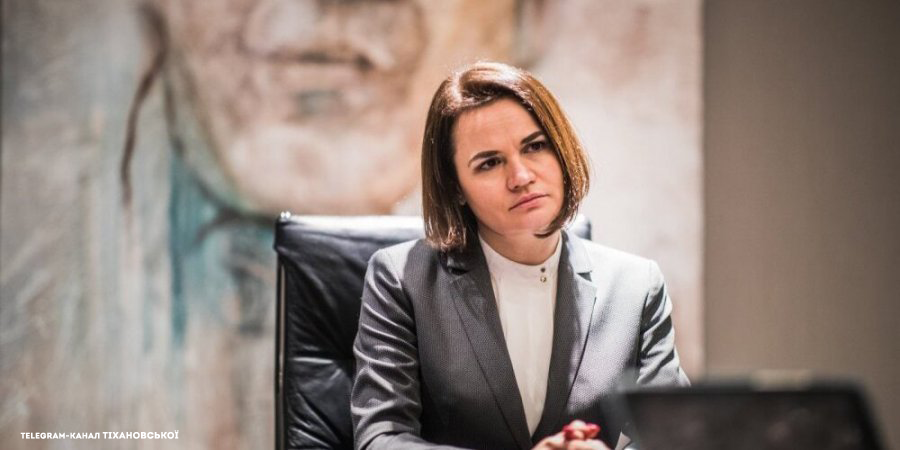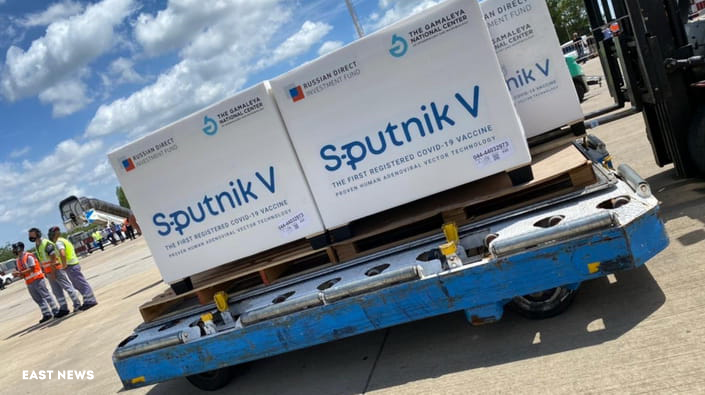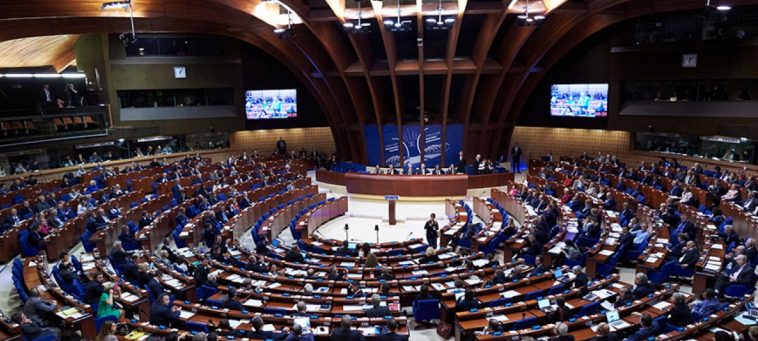Situation in the combat zone

On January 31, Russia-backed militants fired upon the Ukrainian troops’ positions in Donbas nine times. Ukraine’s Joint Forces incurred no casualties. Similar attacks were recorded throughout the week.
Ukrainian serviceman injured in the line of duty dies. On January 30, a Ukrainian serviceman injured by a hostile sniper during the night shift on January 26, died in hospital in Dnipro. The soldier, Roman Dziubenko was a Donbas native. On the evening of January 26, a sniper of the Russia’s hybrid forces shot him in the head during the attack on the Ukrainian Armed Forces near Novooleksandrivka. Medics were fighting to save his life for four days.
OSCE. The OSCE Special Monitoring Mission to Ukraine (OSCE SMM) recorded artillery and tanks beyond the designated withdrawal lines in the uncontrolled territory. Mission monitors also reported of 10 infantry fighting vehicles deployed to the training ground outside Novoselivka in the area not controlled by the government. The OSCE refered to it as military or military-type presence in the security zone.
By deploying weapons in violation of the designated withdrawal lines, Russia-backed militants blatantly violate the Minsk agreements, the Joint Coordination and Control Center for ceasefire and stabilization of the contact line underscored quoting the OSCE SMM report of January 30.
Propagandistic forum in Donetsk. Last week, the forum “Russian Donbass” (Russkiy Donbass) was held in the Russia-occupied Donetsk. Its participants adopted a doctrine, which shares the same name as the forum, and declares integration with Russia a major policy of the occupation administrations in Donetsk and Luhansk regions.
The propagandistic forum “Russian Donbass” was organized by the Russian Federation in occupied Donetsk to disrupt the peaceful reintegration of the temporarily occupied territory into Ukraine, Oleh Nikolenko, spokesperson of the Foreign Affairs Ministry of Ukraine told UNIAN agency in a comment. “By holding a propagandistic forum in occupied Donetsk, the Russian state leaders don’t give up on the idea to reshape Ukraine so that it fits into their patterns. The Kremlin’s continuous attempts to impose the “russkiy mir” (Russian peace) in Donbas and drag it into the toxic news space part ways with the Russian Federation’s commitments toward the peaceful settlement of the Russian-Ukrainian military conflict. The ‘forum’ has the sole aim of creating hurdles for the peaceful reintegration of the temporarily occupied territories. Ukraine will definitely notify its foreign partners on yet another example of Russia’s subversive work in Donbas,” Nikolenko underscored.
PACE ratifies credentials of the Russian delegation
The respective resolution passed on January 28 by a vote of 107 to 36, with 24 abstentions.
Ukraine saw the decision as disappointment as it had been challenging the credentials of the Russian Federation in PACE.
In summer 2019, Russia convinced the key Western member states to lift the sanctions against it, and returned to the session hall, while the grounds for the restrictive measures never disappeared.
Thus, they include the same old claims: non-implementation by Russia of its commitments under almost 50 resolutions of the Assembly, and direct involvement of some Russian senators in the illegal annexation of Crimea. More than that, a recent intermediary decision by the European Court of Human Rights in the case “Ukraine v. Russia” makes it clear that Russia exercised effective control of Crimea already in late February 2014, when it orchestrated the fake “referendum” in Crimea. Those grounds also include the torture of hostages and prisoners of war in the Russian detention facilities, and, finally, the Navalny case and all the human rights violations it entails.
First contact: Belarus opposition leader Tsikhanouskaya in conversation with Ukraine’s foreign chief

On January 29, foreign affairs ministers of Ukraine, Poland, and Lithuania met online. Sviatlana Tsikhanouskaya joined the meeting at the invitation of Ukraine’s Foreign Affairs Minister Dmytro Kuleba.
That’s the first contact between Tsikhanouskaya and representatives of Ukraine.
At the meeting, Tsikhanouskaya called to impose tougher sanctions on all individuals involved in the election fraud and repressions, including Lukashenko himself. She also envisaged the prospect of creating an international coalition for a smooth transfer of power in Belarus.
The opposition leader was also hopeful of seeing the Lublin Triangle turn into the Lublin Four as a democratic Belarus would join.
Minister Kuleba said that the Lublin Triangle is indeed incomplete without Belarus. “We would like a democratic Belarus to join and turn (the initiative) into the Lublin Four. The situation in Belarus does not only have an impact on the country’s bilateral relations with the neighbors, but also affects the overall situation in the region. That’s why our conversation with Tsikhanouskaya had a regional outlook,” Kuleba concluded.
“Ukraine has been consistent in supporting the people of Belarus in its fight for the rights and a democratic change,” the Minister added.
To remind, the protests and strikes in Belarus continue for more than five months. Belarusians demand new, fair elections, and liberation of all political prisoners.
Many protesters were persecuted, thousands got arrested. Police used stun grenades, rubber bullets, and water cannons against the protesters, and violently beat them. According to Sviatlana Tsikhanouskaya, at least eight persons were killed since the protests broke out.
How Russia weaponizes its vaccine in information war

Russia uses its “Sputnik V” vaccine to polarize the Ukrainian society. An article by Liubov Tsybulska, Head of Hybrid Warfare Analytical Group at Ukraine Crisis Media Center originally published in Ukrainian on “Yevropeiska Pravda” takes a closer look at the threat. Check out the highlights below or follow the link to read the article in full.
The “war of vaccines”. Russian MFA spokeswoman Maria Zakharova recently stated that the “vaccine war” had begun. It is a typical Kremlin way of legitimizing extremely aggressive rhetoric – trying to use a non-political topic to inflame public negative sentiments.
This is a formula under which Kremlin is operating all over the world, but in Ukraine they use it the most effectively due to several key factors: presence of pro-Russian media and a wide variety of different types of politicians.
Vaccine as Russia’s propaganda weapon. For Ukraine, the issue of vaccination is acute, as it will affect all spheres of life. Tourism, work and studying abroad – everywhere being vaccinated will mean open covid-curtains, as they are now called.
However, there is more to it. Because of vaccination, the country has been subjected to polarization along the lines “Russia or the West.”
Even before the new year began, our analytical group recorded increased activity of both Russian and pro-Russian players in Ukraine:
– Europe is vaccinating its population at full speed, and they do not care about Ukraine. Ukraine will not receive Western vaccines.
– Russia is ready to lend a helping hand and provide Ukrainians with its vaccine.
How it works. Traditionally, these messages are first stated by Kremlin actors and then disseminated by their satellites in Ukraine – media associated with Viktor Medvedchuk, as well as deputies from his political party.
At the same time, a petition appears on the president’s website demanding the purchase of the Russian Sputnik V vaccine, Kharkiv company “Biolik” is trying to register it, and Dmitriy Peskov, Putin’s press secretary, claims that the production of Sputnik is possible in Ukraine if Ukrainian authorities agree to it.
The shortcomings of other vaccines are scrupulously sought out, all the difficulties surrounding their introduction are reported, and each fatal case is covered as another absolute proof of their ineffectiveness.
At the same time, openly manipulative points such as injecting microchips via vaccines or “the West uses Ukraine as a testing ground” are actively promoted.
How Ukraine is fighting COVID-19

On February 1, Ukraine reported 2,030 new coronavirus cases; 5,131 recoveries; 61 deaths, and 1,103 hospitalizations.
Throughout the pandemic, Ukraine has recorded 1,221,485 coronavirus cases; 1,023,915 recoveries, and 22,768 deaths.
Vaccination campaign. The rollout of the vaccination campaign in Ukraine can start on February 15 or later. Ukraine is to receive at least eight million doses of the COVID-19 vaccines through the COVAX facility, enough for four million Ukrainians.
Ukraine’s Chief Sanitary Doctor Viktor Liashko said that first batches of coronavirus vaccine are expected to arrive in February 2021. Ukraine will likely get the Pfizer-BioNTech COVID-19 vaccine.
The Health Ministry of Ukraine has adopted the COVID-19 vaccination plan for 2021-2022. At least half of the population (over 20 million persons) is to be immunized during this time.




